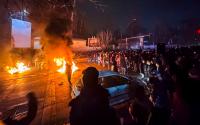Published on Sunday, December 12, 2004 by the Los Angeles TimesHéctor Tobar
The United States is the big odd man out as diplomats, scientists and environmentalists from more than 190 countries gather here at the 10th meeting of the United Nations' Framework Convention on Climate Change.
The focus of the convention is the 1997 Kyoto Protocol, which mandates reduction of greenhouse gases that cause global warming and will take effect next year.
Discussions of new limits are expected to begin here when official delegations arrive Wednesday, near the end of the 12-day conference.
Among major industrial countries, only the U.S. and Australia have failed to ratify the accord, which commits signatory nations to reduce their emissions of carbon dioxide, methane and other gases to 5.2% below 1990 levels by 2012.
Observers here say the U.S. is increasingly being shut out as the rest of the world adopts global mechanisms by which each country will meet its targeted reductions, including one that allows companies to trade reductions in carbon emissions in a kind of global pollution market.
The U.S., which accounts for about a third of the world's greenhouse gas emissions, pulled out of the agreement in 2001.
U.S. officials last week acknowledged a global rise in temperatures caused by human activity but said the increase had not yet reached the "dangerous" levels that required drastic action.
They reiterated that the Bush administration would not push for U.S. ratification of the accord.
"The Kyoto Protocol was a political agreement," said Harlan L. Watson, President Bush's senior climate negotiator and head of the U.S. delegation to the conference. "It was not based on science."
Watson, a physicist, is playing the role of spoilsport at the conference, enduring the private criticism of fellow delegates and the thinly veiled hostility of environmentalists who have come to the conference in large numbers as observers.
"I'm not sure why we are considered the 'bad boys,' " Watson said at a news conference last week. "We believe we match or exceed what any other country in the world is doing to address the issue."
Watson and other U.S. officials here point out that the Bush administration has set aside billions to fund climate research and weather-monitoring programs around the world.
In 2002, Bush committed to reducing greenhouse gas emissions by 18% by 2012 but linked those reductions to growth in gross domestic product.
However, U.S. officials at the conference said emissions would probably be 15% above 1990 levels, far higher than mandated in the Kyoto pact.
The U.S. plan is based chiefly on voluntary measures, because administration officials believe that mandatory limits would hinder economic growth.
At another session, Watson took questions from environmentalists and acknowledged the scientific consensus on global warming: that the global temperature had risen 1.1 degrees Fahrenheit in the last century and that the increase was linked to human activity.
There is also widespread agreement that climate science is not yet able to predict with precision what the long-term consequences of global warming will be.
"There's a lot of uncertainty, and we'll leave it at that," Watson told the environmentalists. He said the U.S. would not revisit its goals for greenhouse gas reduction until 2012, when it would reassess a new round of climate studies.
In the meantime, much of the rest of the developing world will begin implementing the Kyoto Protocol. The agreement passed its final hurdle in November when Russia ratified the treaty.
Yvo de Boer, the chief negotiator on climate issues for the European Union, said the political atmosphere had changed considerably in favor of worldwide action to combat global warming.
"There was a great reluctance before the Russian ratification to begin any change toward the future," De Boer said. "That situation has clearly changed."
Environmental groups such as the World Wide Fund for Nature are pushing the signatories to move toward even stricter limits.
Although no major agreements are expected as the convention reaches a close this week, the officials will probably make progress on many of the agreement's technical details.
During a series of meetings and workshops last week, businesspeople, environmentalists and U.N. scientists and officials debated the new global regulations, standards and bureaucracy that would be created to monitor greenhouse gas emissions and ensure compliance with the Kyoto reduction targets.
"What you're seeing here is the very early stages of the creation of a kind of central bank," one European delegate said after sitting through a two-hour question-and-answer session with the Clean Development Mechanism Executive Board, one of many entities created by the Climate Convention.
Among other things, the board is establishing the standards for a potentially lucrative market in "emissions trading," whereby an electric plant in Europe might pay an electric plant in China to reduce its emissions of carbon dioxide, and thus avoid cutting its own emissions.
Several U.S., European and Asian utility companies sent representatives to the gathering. Neil Cohn of Natsource, a New York-based company, came to the convention with an extensive Power Point presentation on "carbon trading."
"We're creating a tool to reach the Kyoto objectives," Cohn said.
Environmentalists hope that in the long run, U.S. companies will pressure Washington to play a greater role in the worldwide effort to reduce global warming.
Many utility companies believe that strict controls on emissions are inevitable in the future.
"They know something is coming and they want to be able to plan for it," said Lee Hayes Byron of the U.S. Climate Action Network. "They want to be able to tell their shareholders they're ready."






